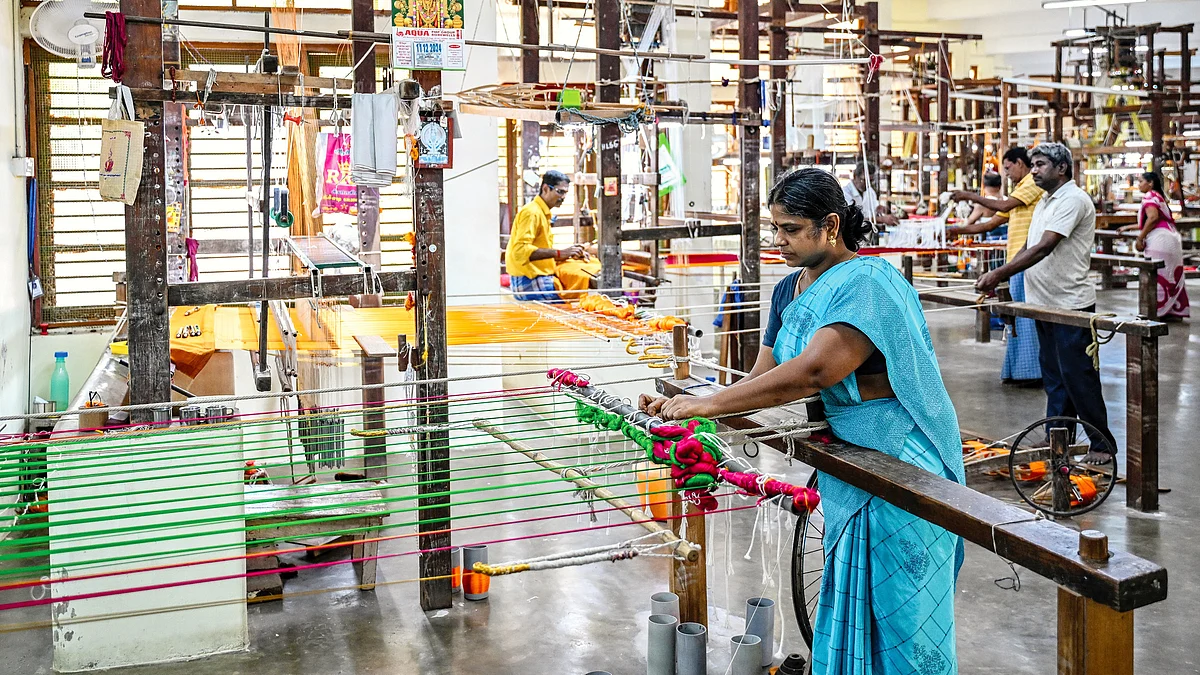Tariff tsunami hits India’s southern states
No immediate fear of mass layoffs, but exporters are urging the government to negotiate with the US, a la EU and Japan

US President Donald Trump’s exorbitant tariff demands have shaken global trade, with India among the worst hit. India enjoys a healthy trade surplus of approximately $46 billion. Any change is bound to have repercussions. Indian exports, mainly in the pharmaceutical, textiles, gems and jewellery sector and even smart phones, are likely to be hit adversely.
South India is particularly vulnerable. Tamil Nadu, for example, is a major producer of textiles with thriving industrial towns like Tiruppur and Karur teeming with small and medium-sized enterprises making cotton goods. Tiruppur is a centre for knitwear, producing inner wear and T-shirts while Karur is known for home linens. Both rely heavily on the US market.
The 25 per cent tariff on Indian goods, with a possible additional 25 per cent by 27 August — if India doesn’t halt Russian oil purchases — has set the alarm bells ringing.
K.M. Subramanian, president of the Tiruppur exporters’ association, told a Tamil newspaper that a 50 per cent tariff would bump up export costs by Rs 12,000 crore. It will be easier for US wholesale buyers to turn to Bangladesh and Vietnam where production remains cheaper and tariff-free.
While there is no immediate fear of mass layoffs, exporters are urging the government to negotiate with the US, much like the EU and Japan have done. A recent tax-free deal with the UK may cushion the blow temporarily, as orders shift to Europe.
Tamil Nadu industries minister T.R.B. Rajaa is confident the state can weather the storm. Contingency plans are in place to shield key manufacturing, textiles and footwear sectors which include diversifying export markets and building buffers. “We’re robust enough to deal with this just as we were able to handle Covid and other global disruptions,” he adds.
Andhra Pradesh and Telangana, too, face the heat. The region’s aluminium extrusion units, which supply inputs to a variety of industries such as EV and consumer electronics — with exports totalling over $3.5 billion in 2024 — will also feel the pinch.
Telangana’s IT industry, second only to Bengaluru, is also worried. The state’s IT advisor Sai Krishna has warned of a cascading effect through impact on staff mobility and reduced IT spending by American companies. With IT exports worth $32 billion in 2024, the impact could slow down the processing of visas for on-site teams and consultants, impacting business.
Rising import costs for physical goods could increase expenses for US companies, potentially leading to spending cuts. Indian IT companies are now pivoting towards remote work models and diversifying markets across Europe, Asia and Latin America to offset their US exposure.
Phil Fersht, CEO of US-based HfS Research, says, “Tariffs are the new wrecking ball for IT.”
Tariff threats extend to industries like granite in Karnataka where quarries fear the worst even though the announced tariff is 10 per cent. At the time of writing, containers loaded with granite were stuck at Chennai port because of the fear that the rates could go up further, making exports totally unviable.
One industry that may have dodged the bullet for now is the pharma industry. Hyderabad, the pharma capital of India, watches with cautious optimism. Most medicines are exempt — a 10 per cent tariff could still be applied — an indication of how dependent the US is on Indian generic medicines, which it cannot replace easily without disruptions.
Seafood exporters, on the other hand, are in deep trouble. The US picks up nearly 40 per cent of the country’s exports valued at Rs 40,000 crore. In Andhra Pradesh — home to a sizeable aquaculture economy with frozen shrimp being a major export item — exporters already operating on wafer-thin margins are worried. With multiple duties currently in place, the additional 25 per cent will bring the total to a staggering 59.72 per cent. The state contributes to 60 per cent of India’s shrimp exports, making for 92 per cent of India’s marine product exports.
Prasad Reddy, an exporter from Nellore, said shrimp exporters are petitioning the state government for fiscal concessions. They are also looking at new export markets such as Russia. Pawan Kumar, president of the Seafood Exporters Association of India, put it bluntly, “We are shocked. This is doomsday for the industry.”
While the US is not a market for India’s cars, auto parts manufacturing companies will feel the pressure. Bengaluru-based Bosch (engine parts, brakes and electrical fittings), Tirupati-based battery maker Amara Raja, and pumps and radiator-maker Sundaram Fasteners — with combined exports to US worth Rs 60,000 crore — now face serious headwinds.
Even Kerala, which lacks a strong manufacturing base, has reason to fear. Finance minister K.N. Balagopal says tariffs could wreak havoc on exports of seafood, spices and coir and compared the potential impact to the Covid-era slump.
Punjab, too, is expected to be affected, especially its cycle, auto parts and hosiery industry as also premium rice exporters, all of whom depend on exports to the US and could face reduced orders.
Follow us on: Facebook, Twitter, Google News, Instagram
Join our official telegram channel (@nationalherald) and stay updated with the latest headlines
